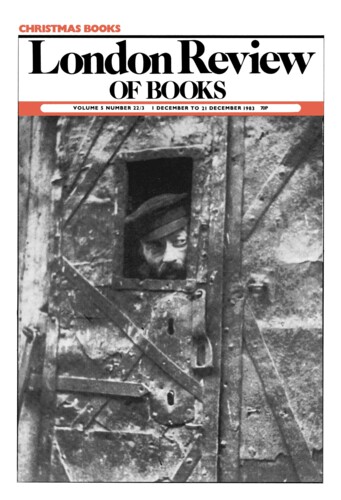Fourth from the top
Martin Kemp, 1 December 1983
Dame Frances Yates was an explorer: someone who pushed forward the frontiers of the generally known world, discovering and charting previously unmapped territory. The metaphors of exploration which abound in her own writings are not, therefore, merely rhetorical devices. Thirty years ago Ramon Lull’s philosophical output was a ‘huge un-climbed mountain’ and she was planning ‘a, reconaissance expedition searching out new routes for some future attempt on the summit’. The range of his thought was a ‘vast and virtually unknown country’. His Abor Scientiae was a ‘forest of trees’ into which she intended ‘to force a way’. She conducted her explorations with a genuine missionary passion. She spoke, characteristically, of being ‘electrified’ when she saw an illustration of Scotus’s cosmology which provided a new insight into Lull’s mysterious art. She had a vivid sense of the reality of the characters she encountered on her intellectual travels. In her speech accepting the Premio Galileo Galilei, which opens the second volume, she credited John Florio, a brilliant promoter of Italian learning in 16th-century London, with introducing her not only to Giordano Bruno but also to ‘members of the Warburg Institute, then newly arrived in London with their wonderful library’. In her dealings with past and present members of the intellectual community, she maintained a transparent honesty. She openly admitted, for example, that Lull’s New Treatise on Astronomy ‘seemed perfectly unintelligible’ on initial acquaintance. And when, even after unrivalled endeavours, there remained areas of doubt, she qualified her interpretation with such words as ‘so far as I am able to understand these results …’ Her scrupulous sense of the limits of her own findings is entirely consistent with her repeated desire to open up further areas of exploration for her successors.

